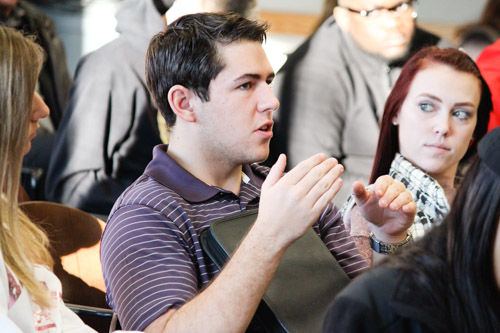Student ‘watch list’ ignites concern
January 29, 2018
DeKALB — Dean of Students Kelly Wesener Michael spoke to students Saturday in an attempt to put to rest some misconceptions about a “watch list” rumored to track students’ social media accounts.
The Division of Student Affairs addressed the rumor of tracking students’ social media accounts as “inaccurate” and said the university uses a software to keep track of the different compliance requirements of student groups and organizations, according to a Jan. 26 statement on the Division of Student Affairs webpage.
The rumor about the university’s use of a watch list received traction on social media when an individual with the Twitter handle @noniuwatchlist began posting photos of redacted documents with students’ organization affiliations while using the hashtag #SaveNIU.
Maxient, a recording-keeping software, has been used by the university since 2010 to keep files of students who are involved in a number of situations, such as being the witness to a crime, behavioral concerns or if someone broke their leg, Wesener Michael said. The system serves over 800 universities throughout the country, according to its website.
“I think the biggest concern is that they weren’t made aware that they were put on the watch list,” said Student Association President Rachel Jacob. “I think it’s a major transparency issue that needs to be clarified within the NIU administration.”
A meeting was held Saturday at the Campus Life Building Room 100 to address some of the concerns students have regarding their information being collected.
Evan Johnson, Phi Kappa Theta president, said he thinks the person behind the #SaveNIU movement is “a hero” because it alerted students about their information being collected. He said he also appreciated the university’s willingness to address the issue, but the larger picture of finding a solution needs to be addressed.
“I was content with the fact that they decided to come in and speak about the issue,” Johnson said. “Personally, I feel like that was no solution, which I’m disappointed in.”
Wesener Michael said the term “watch lists” was not chosen by university officials, but it’s actually proprietary programming language used by the Maxient software.
Members of Greek life are added to the software because the university is obligated to notify national chapters, Wesener Michael said. Requests to add NCAA student-athletes and members of the CHANCE program were also honored.
“The only way you get on this is because we have an obligation to notify someone else that something is happening to the members within this organization,” Wesener Michael said.
The names of students who may be a witness to an incident can also be added to the list at the request of an “oversight administrator,” but university officials are unable to remove the individual because of obligations to the state, Wesener Michael said. After the Division of Student Affairs Office receives a notification, they alert administrators who then decide how to proceed.
Wesener Michael declined to name who’s an “oversight administrator” and what office they work for.
Johnson said his fraternity advisor and national chapter has not requested his fraternity be added to the watch list.
Students who aren’t bound to the additional compliance standards of organizations can also be added to the Maxient system by other university employees, including professors, if they exhibit “concerning behavior,” such as disruptions in the classroom, suicidal behavior, among others.
If a student who has been added to the list is cleared of any fault in an incident, that information is documented into the software, which the university is required to hold for a certain number of years under the Records Retention Law, Wesener Michael said.
“We cannot share your information with anyone unless you sign a waiver,” Wesener Michael said.
There are screenshots in the system, but they only appear when students or parents file an incident report and attach the screenshot as evidence.
“NIU does not monitor any personal media accounts at all,” Wesener Michael said. “The reason we would engage in a social media interaction is because an individual tagged the university.”
Wesener Michael said the officials believe a parent made a Freedom of Information Act request for the names of students on the watch list and then turned to social media with the files with the personal information missing.
“That is not anything we did,” Wesener Michael said. “It was shared by an outside entity who got the information through a system that anyone has access to.”
Wesener Michael said university officials didn’t inform students about the Maxient system because the administration only “meant to use it for good” but will look into the processes and procedures of the watch list and plan to be more transparent about how they collect student data.
“Now we have a better sense of this, and we’re going to work toward complete transparency moving forward,” Wesener Michael said.
Johnson said he thinks it’s important officials work with Greeks to ensure transparency between students and student conduct.
“Greeks do not want to cause a problem with student conduct,” Johnson said. “We want to create a policy that will benefit this school. We want to make sure there’s a positive light being shone on the school and the Greek system.”







